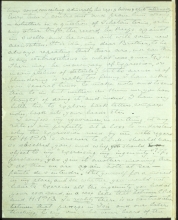Page 2
turns round, concealing admirably his rage and hisses and spits internally. Every time I contradict and prove him wrong, — whether in a question of Tibetan terms, or in any other trifle, the record he keeps against me swells, and he comes out with some new accusation. It is idle, my dear brother, to be always repeating that there are, nor can there be any contradictions in what was given to you. There may be inaccuracy of expression, or incompleteness of detail; but to accuse us of blundering is really too funny. I have asked you several times to make notes and to send them to me, but neither Mr. Hume nor you have thought of doing it; and indeed, I have very little time to explore back letters, compare notes, look into your heads, etc.
I confess my ignorance, in one thing at any rate. I am perfectly at a loss to understand why the expression used by me with regard to H.P.B.'s answer to C.C.M. should have so shocked you; and why you should object to my "exercising my ingenuity"? If, perchance, you give it another meaning than I do, then we are again both at sea — faute de s'entendre. Put yourself for a moment in my place, and see whether you would not have to exercise all the ingenuity you had at your command, in a case like that between C.C.M. and H.P.B. In reality, there is no contradiction between that passage in Isis and our later teaching; to anyone, who never heard of the



faute de s'entendre means "for lack of agreement".